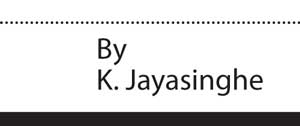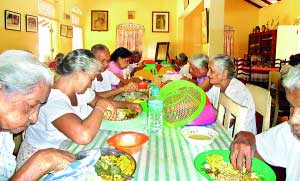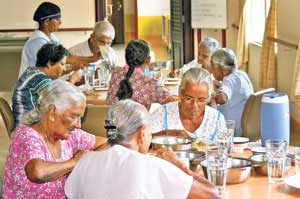Reply To:
Name - Reply Comment
Last Updated : 2024-04-19 08:31:00
 On October 1, we commemorated the International Day of the Elders. Sri Lanka has become a country with an ageing population which is increasing more rapidly than the other countries in the world as predicted by demographers. It is timely and appropriate to observe the challenges faced by elders and discuss possible avenues available for them to face these challenges.
On October 1, we commemorated the International Day of the Elders. Sri Lanka has become a country with an ageing population which is increasing more rapidly than the other countries in the world as predicted by demographers. It is timely and appropriate to observe the challenges faced by elders and discuss possible avenues available for them to face these challenges.
Ageing Population
In 2008; the World Bank in the report (No. 43396-LK) titled ‘Sri Lanka addressing the needs of an ageing population’, predicted that ‘’In slightly more than two decades, Sri Lanka’s population will grow as old as of Europe or Japan’s today, but its level of income will be much lower’’. At the 1981 census of population and housing, the proportion of elderly persons - 60 years and over was 6.6%. This has grown to 12.4% as enumerated at the 2012 census. That means for every 10 persons in the country, more than one is elderly. Demographers predict that by 2050, the proportion of the population over 60 years would exceed 28%, more than one for every four persons in the country.
Sri Lanka is achieving this status due to two factors; reduction in fertility and decrease in mortality. Total fertility rate which is generally the average number of children born to a woman over her life time was estimated to be 3.4 in 1974, 2.8 in 1987 and 2.4 in 2012. Similarly mortality has been reduced over the years.
Living arrangements
The traditional methods of living arrangements of the elderly was to spend the evening of life with the family of the youngest son who was blessed with the inheritance of the ancestral home. However, this system has been eroded due to many reasons, such as fast replacement of extended family by the nuclear family mainly due to decrease in family size and children migrating to urban areas and abroad seeking employment and greener pastures. Thus, the elders left behind are faced with ‘Empty Nest Syndrome’. In such a situation the elderly become vulnerable due lack of financial assistance, health care, proper food and increasing loneliness.
 Even if the dutiful children try to get their parents to accompany them when migrating to urban areas or overseas, the uprooted elderly find the new location inconvenient and undesirable to them due to restricted housing facilities and redundancy in a new location, lacking the freedom and familiar environment they lived in. However this migration due to socio-economic reasons is inevitable.
Even if the dutiful children try to get their parents to accompany them when migrating to urban areas or overseas, the uprooted elderly find the new location inconvenient and undesirable to them due to restricted housing facilities and redundancy in a new location, lacking the freedom and familiar environment they lived in. However this migration due to socio-economic reasons is inevitable.
There is a trend in developing elders homes for the care of elders who either look for this option on their own or as an initiative of their children. Over 100 elders homes are scattered around at present which are divided into two categories. Those for destitute elders mostly run by welfare societies, are overcrowed, having waiting lists to get admitted. The other category is, paying homes with a wide range of facilities and at different rates. Establishment of senior citizen’s apartments for assisted independent living, as those available in developed countries, providing security and support and additional services such as janitorial services, healthcare and meals if needed could be attractive as new developments. Those elders who choose to live on their own in urban areas would welcome caregiver services to get support regularly or when needed.
Healthcare
Studies done on health status of the population in Sri Lanka indicate that the most vulnerable in this sector are the elderly. The National Survey on Self-Reported Health in Sri Lanka 2014, a survey conducted by the Department of Census and Statistics using data on self-reported information on health status by a sample of respondents of 25,000 housing units in all districts indicated that the highest prevalence, 55% of chronic illnesses was reported from the age group 60 years and over. Chronic illnesses reported on are; diabetes, high blood pressure, heart diseases, stroke/paralysis, asthma, arthritis and some others. The above information indicates that more than one for every two elderly persons are reported to be suffering from one or more such diseases.
A World Bank study report elaborates that at the time when the study was conducted, the out-of-pocket expenses borne by an elderly patient for an outpatient visit were in the ranges of Rs. 275 at a  public hospital, Rs. 220 at a public dispensary, Rs.1,350 at a private hospital and Rs.1,800 for a private specialist. These rates have gone to higher proportions now. The reports on health status of elderly in Sri Lanka also indicate that the physical disability rate of the elderly has also increased during the past decades. Of all healthcare visits done by the elderly 70% were to government hospitals and outpatient facilities in comparison with 44% by the overall population.
public hospital, Rs. 220 at a public dispensary, Rs.1,350 at a private hospital and Rs.1,800 for a private specialist. These rates have gone to higher proportions now. The reports on health status of elderly in Sri Lanka also indicate that the physical disability rate of the elderly has also increased during the past decades. Of all healthcare visits done by the elderly 70% were to government hospitals and outpatient facilities in comparison with 44% by the overall population.
Transportation is the most difficult hazard older persons have to face in seeking public healthcare facilities, which are distantly located. Our public transport system, mostly used by the majority is not at all supportive to the weak and disabled. Although an identity card for the elderly is being issued indicating the priorities in healthcare, transport, postal and banking the bearer could receive, it is a known fact that hardly any such could be achieved. This is where, the large population of 2,520,000 strong elderly, all having voting rights in Sri Lanka amounting to 16 percent of the total voter strength of 15,421,000 registered for 2015 as published by the Elections
Commissioner should get together and fight for their rights. If properly organized and effectively campaigned, demands of such a large voter base could not be overlooked by the politicians seeking power. An example is that during the recent election campaigns, both the powerful political parties proposed concessionary fixed deposits up to Rs, 1,000,000 at 15% interest for the elderly. This was later campaigned to be increased to Rs. 2,000,000 which never materialized.
Rights of the Elderly
It is not generally known that elderly are entitled with special legal provisions under the Protection of Rights of Elders Act 9 of 2000. Under this act special institutes, the National Council for Elders and National Secretariat for Elders have been established in the Ministry of Social Empowerment and Welfare. One of the main objectives of these institutions is to protect and promote the rights of the elderly.
 Mental and Psychological well-being of Elderly
Mental and Psychological well-being of Elderly
Whenever healthcare of the elderly is discussed, the primary focus is on non-communicable diseases and physical disability. However, emerging evidences reveal the importance of mental and psychological well-being as well. Reference to an article published, again in the DailyMirror on September 4, titled ‘Lankans 71 years and above are the most suicidal: Police’, is made. This highlighted data tabled in Parliament by Minister of Law and Order, Sagala Rathnayaka. It reported ‘Suicides in Sri Lanka are highest among persons of age of 71 and above, according to data compiled by Police for the past three years’. In this age category 307 elders have taken their own lives, in comparison to a total of 3,058 suicides recorded in 2015.
When those above 60 years, usually defined as elders are considered, in 2015 a total of 683 elders have killed themselves. This was 22 % of all doing suicides. That means close to one out of every four that took their own lives in 2015 was an elderly person. What is more, of those elders, a very high proportion 85% were males. This is in the back ground of only 44% of the elders above 60 years being males. One wonders, what makes such a high proportion of male elders tend to take their own lives. A large proportion of the ever increasing older persons in the country have to depend on their savings or outcomes from the investments if they were fortunate enough to make when they were younger or rely on the support from their children.
All the above scenario emphasise the importance of planning for old age, at least during the late middle aged period, when an able person could still take action and make decisions, without waiting for the unavoidable old age, when it would be too late.

Add comment
Comments will be edited (grammar, spelling and slang) and authorized at the discretion of Daily Mirror online. The website also has the right not to publish selected comments.
Reply To:
Name - Reply Comment
On March 26, a couple arriving from Thailand was arrested with 88 live animal
According to villagers from Naula-Moragolla out of 105 families 80 can afford
Is the situation in Sri Lanka so grim that locals harbour hope that they coul
A recent post on social media revealed that three purple-faced langurs near t